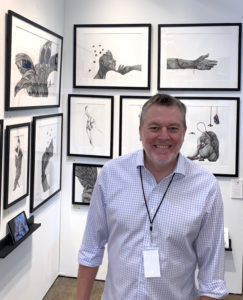Support Groups are the Best Way to Start Your Journey
 After five years of disruptive symptoms, many different doctors and tests, Brian Bowe was diagnosed with neuroendocrine cancer in 2005. “We had to figure out how to fight this ourselves,” he said. “You can’t just listen to what the doctor tells you in the exam room for 15 minutes. I needed more.”
After five years of disruptive symptoms, many different doctors and tests, Brian Bowe was diagnosed with neuroendocrine cancer in 2005. “We had to figure out how to fight this ourselves,” he said. “You can’t just listen to what the doctor tells you in the exam room for 15 minutes. I needed more.”
Brian found something more in a neuroendocrine tumor (NET) support group he and his caregiver started attending in Walnut Creek, California. It was his first step in taking control of his destiny and cancer journey.
The label may confuse some, according to Brian, a bearded, broad-shouldered, six-foot, two-inch tall guy with a commandingly deep voice. “It’s not a group cry or hugs. It’s a safe and friendly environment, where many of the walls and barriers are down, where there are people who understand what you are going through.”
Power in knowledge
Support groups were the launchpad for Brian’s cancer journey. It is where he learned about patient conferences and physicians who specialized in NETs.
“It’s a place where you can go and realize that you are not alone. More importantly, it is finding out that other people have taken control of their journey and have the information, knowledge, and experience to tell you to go see this doctor or that doctor,” said Brian. “It gives you power by providing you with resources.”
Brian had stage IV neuroendocrine cancer of the small intestine with golf-ball-sized metastases to his liver. A support group leader gave Brian the name of a surgeon. That surgeon removed tumors that had wrapped around Brian’s small intestine like rubber bands causing paralyzingly painful bowel obstructions. In the 15 years since his bowel resection, Brian has had PRRT, interventional radiology, somatostatin analogs, and other treatments.
Making connections
Brian described support group meetings as classroom-style gatherings of NET patients and caregivers. A guest speaker offers information on a topic of interest and takes questions. Like school, Brian said you will find personalities of every kind, the person who never talks, the person who always talks, or the person who knows the most.
“It’s a way to help yourself and help others,” he said. “It’s pretty powerful to hear other people’s stories and realize you are not the only one suffering from the things caused by this cancer.”
Brian has met amazing people at support groups. People who inspired him and befriended him. It’s difficult, however, when a fellow group member passes. “It is a grim reminder of how serious this disease is. It also makes you want to continue your fight.”
Moving forward
 After seven years of participating in support groups, Brian’s close-knit circle of friends now includes several individuals who live with NETs. He attends patient conferences to keep up on the latest advancements and to ask questions of experts, but he has stopped attending group meetings. He is managing his health differently due to changes in his life but keeps it his number one priority.
After seven years of participating in support groups, Brian’s close-knit circle of friends now includes several individuals who live with NETs. He attends patient conferences to keep up on the latest advancements and to ask questions of experts, but he has stopped attending group meetings. He is managing his health differently due to changes in his life but keeps it his number one priority.
Brian turned over a new leaf four years ago. Newly single, following a divorce, he dedicated himself to a healthier diet and regular exercise. His overall health and quality of life have improved.
In 2019, Brian was the Executive Director of the Gilroy Garlic Festival, a post he had held for 14 years, when a gunman opened fire on the crowd, killing three and injuring many others. He is working through that stress and trauma with his closest friends and family. As COVID-19 spread across the U.S. in early 2020, Brian left his job with the Festival. “It was overwhelming. I couldn’t take one more call from the FBI, the media, or attorneys,” he said.
A fresh start gave him greater freedom and joy. A special events executive for many years, Brian now enjoys the solitude of working outdoors for a friend’s swimming pool business.
Today, he is in control of his disease and his life. It was by first attending NET support groups that he got to this place of strength and conviction. “It is one of the best possible resources for newly diagnosed patients,” said this survivor of cancer, change, and calamity.
